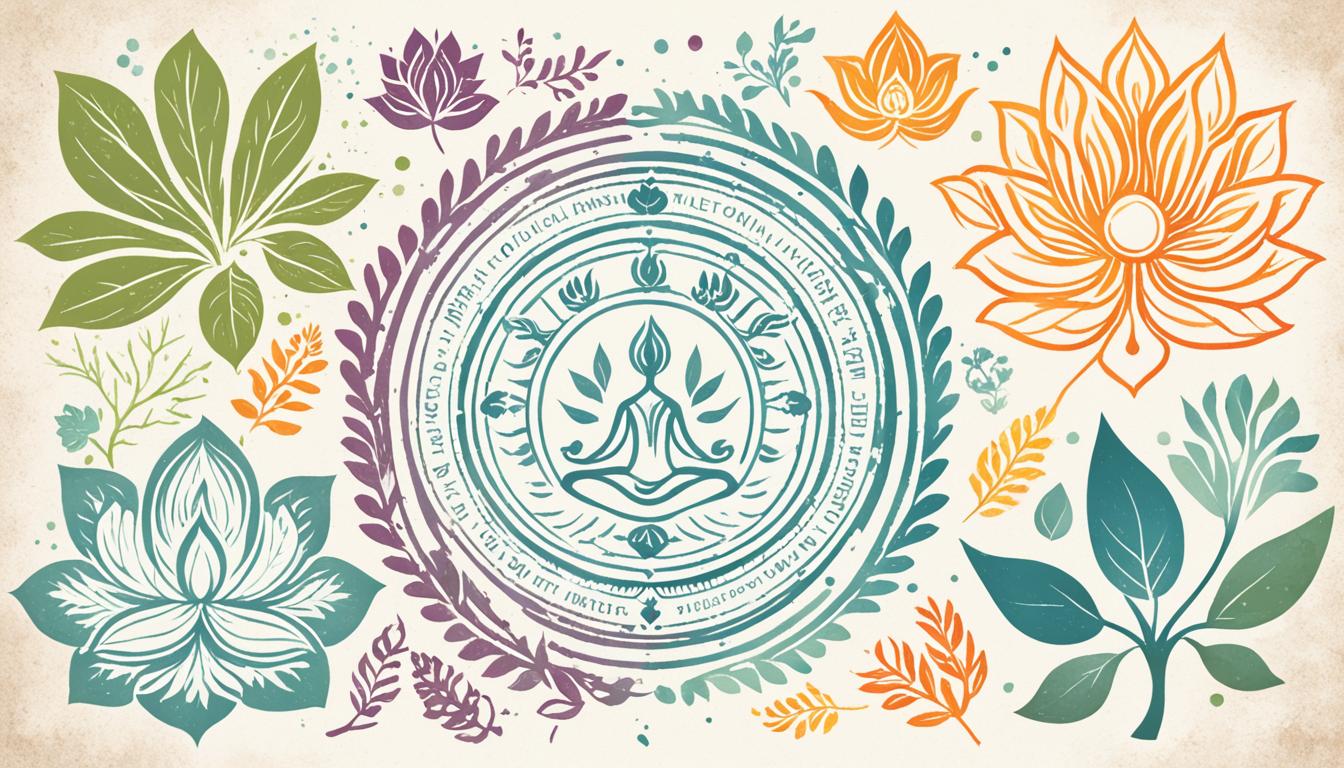Welcome to a journey of self-discovery and inner peace through the powerful practice of Hindu meditation. In this article, we will explore the ancient techniques rooted in yoga philosophy that can help you achieve spiritual enlightenment, relaxation, and mental clarity. Whether you are seeking stress relief, a deeper connection with yourself, or simply a moment of tranquility in your busy life, Hindu meditation offers a pathway to serenity and well-being.
Key Takeaways:
- Hindu meditation practices provide methods for achieving spiritual enlightenment and inner peace.
- It is rooted in yoga philosophy and incorporates mindfulness techniques.
- Hindu meditation offers numerous benefits, including stress reduction and improved cognitive abilities.
- There are various types of Hindu meditation, such as guided meditation and mindfulness meditation.
- Integrating Hindu meditation with yoga can deepen the mind-body connection and promote self-awareness.
What is Hindu Meditation?
Hindu meditation, also known as dhyana in Sanskrit, involves the practice of mindfulness, which means gently concentrating your consciousness on the present moment. It is about grounding yourself in the sensations of your body and focusing on the here and now.
In today’s fast-paced world, where stress and distractions abound, Hindu meditation offers a powerful tool for stress management, emotion regulation, and overall well-being. By cultivating mindfulness, individuals can learn to live in the present moment, free from the burden of past regrets or future anxieties.
Mindfulness, a key aspect of Hindu meditation, allows you to observe your thoughts, feelings, and physical sensations without judgment. With regular practice, you develop a heightened awareness of your inner experiences and the world around you. This opens the doorway to self-discovery, personal growth, and a deeper connection with yourself and others.
A Holistic Approach to Well-being
Hindu meditation takes a holistic approach to well-being, recognizing the interconnectedness of mind, body, and spirit. By calming the mind and bringing it to the present moment, you create space for relaxation, mental clarity, and emotional balance.
By embracing mindfulness and the practice of Hindu meditation, you can equip yourself with essential tools for stress management. When you are fully present in the moment, it becomes easier to identify and respond to stressors in a healthy and proactive manner.
Moreover, Hindu meditation fosters emotional regulation, allowing you to navigate and regulate your emotions effectively. Rather than being consumed by negative thoughts and emotions, you develop the ability to observe them without attachment, enabling greater emotional resilience and inner peace.

The holistic nature of Hindu meditation extends beyond the boundaries of individual well-being. As you cultivate mindfulness and inner peace, you radiate positivity and compassion, positively impacting your relationships and the world around you.
In the next section, we will explore the numerous benefits that Hindu meditation offers for mental and physical health. Join us as we delve deeper into the transformative power of this ancient practice.
The Benefits of Hindu Meditation
Hindu meditation offers numerous benefits for both your mental and physical health. With regular practice, you can enhance your cognitive abilities, improve brain health, and experience a reduction in stress, anxiety, and depression symptoms. Additionally, Hindu meditation can aid in pain management and provide relief for individuals suffering from chronic diseases. This ancient practice is a powerful tool for improving overall well-being and finding peace in the midst of life’s challenges.
Research has shown that cognitive abilities can be enhanced through the practice of Hindu meditation. By training your mind to focus and concentrate during meditation, you can sharpen your cognitive skills, boost your memory, and improve your ability to process information.
Moreover, Hindu meditation has been found to have positive effects on brain health. Regular meditation practice has been shown to delay brain aging, promoting healthier brain function and reducing the risk of cognitive decline.
One of the significant benefits of Hindu meditation is its ability to reduce stress and promote relaxation. By calming the mind and practicing mindfulness, you can lower stress levels and cultivate a sense of inner peace. This can have a profound impact on your overall well-being and quality of life.
Hindu meditation also serves as a valuable tool for relieving anxiety and managing symptoms of depression. Through the practice of meditation, you can learn to cultivate a positive mindset, regulate your emotions, and find balance in your mental and emotional well-being.
In addition to its impact on mental health, Hindu meditation can also contribute to pain management. By focusing your mind and practicing mindfulness during meditation, you can develop the ability to reduce the perception of pain and find relief from chronic discomfort.
For individuals suffering from chronic diseases, Hindu meditation can offer a holistic approach to improving their quality of life. By reducing stress, managing pain, and promoting overall well-being, meditation can help individuals cope with the challenges associated with chronic conditions.
Overall, Hindu meditation provides a powerful and effective means of enhancing cognitive ability, promoting brain health, reducing stress, relieving anxiety and depression symptoms, managing pain, and improving the well-being of individuals with chronic diseases. It is a valuable practice that can bring transformative benefits to individuals seeking relief, clarity, and inner peace in their lives.

Types of Hindu Meditation
Hindu meditation encompasses various techniques and styles to achieve a calm state of being. By exploring different types of meditation, you can find the approach that resonates with you and brings you the most benefit.
Guided Meditation
In guided meditation, a teacher or instructor leads the meditation session, providing instructions and guidance throughout the practice. This type of meditation is helpful for beginners or those who prefer external support and direction. Guided meditation allows you to relax and focus on the teacher’s voice, making it easier to let go of distractions and enter a meditative state.
Mantra Meditation
In mantra meditation, you use a repeated word or phrase, known as a mantra, as the focus of your meditation. By chanting or silently repeating the mantra, you can help calm your mind and increase your concentration. Mantra meditation is an effective way to achieve deep relaxation and mental clarity, allowing you to disconnect from daily stressors and connect with your inner self.
Mindfulness Meditation
Mindfulness meditation involves staying present in the moment and cultivating a non-judgmental awareness of your thoughts, feelings, and sensations. By observing your experiences without attachment or criticism, you can develop a sense of acceptance and inner peace. Mindfulness meditation is a popular practice for stress reduction, emotion regulation, and improving overall well-being.
Movement-Based Meditation: Qi Gong and Tai Chi
Qi Gong and Tai Chi are movement-based meditation practices that combine physical movement, breathwork, and meditation. These ancient Chinese practices promote the flow of energy (qi) throughout the body, allowing you to achieve a state of harmony and balance. By synchronizing your movements with your breath and focusing your mind, you can experience a sense of calmness, increased flexibility, and improved overall well-being.
Transcendental Meditation
Transcendental meditation (TM) is a popular form of Hindu meditation that utilizes a specific mantra assigned by a trained teacher. The mantra is silently repeated to help the meditator achieve a state of deep relaxation and transcendence. TM aims to access the transcendent state of pure consciousness, allowing for enhanced creativity, reduced stress, and improved clarity of thought.

These are just a few examples of the types of Hindu meditation available. Each technique offers unique benefits and can be tailored to suit your preferences and goals. Whether you prefer guided meditation, mantra repetition, mindfulness, movement-based practices, or transcendental meditation, there is a type of Hindu meditation that can support your journey towards inner peace, mindfulness, and well-being.
Integrating Hindu Meditation with Yoga
Hindu meditation and yoga go hand in hand, as these practices intertwine seamlessly to enhance overall well-being. At its core, yoga philosophy encourages individuals to focus on the present moment and cultivate self-awareness through postures (asanas), breathwork, and meditation. When combined with mindful yoga, which blends Buddhist-style mindfulness practice with yoga asanas, these practices create a powerful synergy of mind-body connection and spiritual growth.
By incorporating mindfulness into your yoga practice, you can deepen your awareness of the mind-body connection. As you move through the yoga postures and pay attention to your breath, you cultivate a sense of presence and inner awareness. Mindful yoga helps you experience each moment fully, fostering a greater connection with your body and creating a space for self-exploration.
This integration of Hindu meditation and yoga not only brings physical benefits but also allows for emotional and spiritual growth. By centering your mind and being present during your yoga practice, you create an opportunity to transcend everyday stress and find inner peace. The mind-body connection established through mindful yoga fosters a deeper understanding of yourself and promotes self-awareness and personal growth.
The combination of Hindu meditation and yoga offers a holistic approach to overall well-being, allowing for spiritual growth and a profound sense of serenity. Through this practice, you can cultivate self-awareness, deepen your mind-body connection, and embark on a journey of spiritual transformation.

Conclusion
Hindu meditation is a powerful practice that can lead to spiritual growth, inner peace, and enhanced well-being. By incorporating mindfulness and meditation techniques into your daily life, you can experience deep relaxation, mental clarity, and a profound connection with yourself and the world around you. Rooted in yoga philosophy, Hindu meditation takes a holistic approach to finding tranquility and serenity.
Through embracing these ancient techniques, you can embark on a journey towards a more fulfilling and peaceful existence. The practice of Hindu meditation allows you to quiet your mind, cultivate self-awareness, and tap into your inner wisdom. It offers a doorway to explore the depths of your being and discover the true essence of who you are.
By dedicating time to Hindu meditation, you can nurture your spiritual growth, foster inner peace, and experience a profound sense of well-being. The practice provides a space for self-reflection, self-discovery, and self-transformation. As you continue on this path, you will develop a deeper understanding of yourself and your place in the world, finding harmony and balance in every aspect of your life.
FAQ
What is Hindu meditation?
Hindu meditation is a practice that involves gently concentrating your consciousness on the present moment, grounding yourself in the sensations of your body, and focusing on the here and now. It is an ancient technique rooted in yoga philosophy that helps manage stress, regulate emotions, and live a happier and more fulfilling life.
What are the benefits of Hindu meditation?
Regular practice of Hindu meditation has been shown to enhance cognitive abilities, delay brain aging, and lower stress, anxiety, and depression symptoms. It also contributes to pain management and can improve the quality of life for individuals suffering from chronic diseases. Hindu meditation offers a path to improved well-being and relief from the challenges of daily life.
What are the different types of Hindu meditation?
Hindu meditation encompasses various techniques and styles, including guided meditation, mantra meditation, mindfulness meditation, qi gong, tai chi, and transcendental meditation. Exploring these different practices can help individuals find the approach that resonates with them and brings them the most benefit.
How does Hindu meditation integrate with yoga?
Hindu meditation and yoga are closely intertwined practices. Yoga encourages focusing on the present moment and cultivating self-awareness through postures, breathwork, and meditation. Mindful yoga, in particular, combines Buddhist-style mindfulness practice with yoga asanas. Both practices aim to create a sense of peace, reduce stress, deepen the mind-body connection, and promote spiritual growth.
How can Hindu meditation contribute to inner peace and well-being?
By incorporating mindfulness and meditation practices into daily life, individuals can experience relaxation, mental clarity, and a deeper connection with themselves and the world around them. Hindu meditation, rooted in yoga philosophy, provides a holistic approach to finding tranquility and serenity. Embracing these ancient techniques can lead to a more fulfilling and peaceful existence.
Source Links
- https://www.linkedin.com/pulse/finding-serenity-mat-how-yoga-empowers-mindfulness-khushboo-garach
- https://medium.com/@vishalmendonj69/ancient-indian-mindfulness-cultivating-inner-peace-amidst-chaos-6b3f83a8ae00
- https://www.linkedin.com/pulse/yogaveda-embracing-holistic-beauty-radiance-inside-parthasarathy


